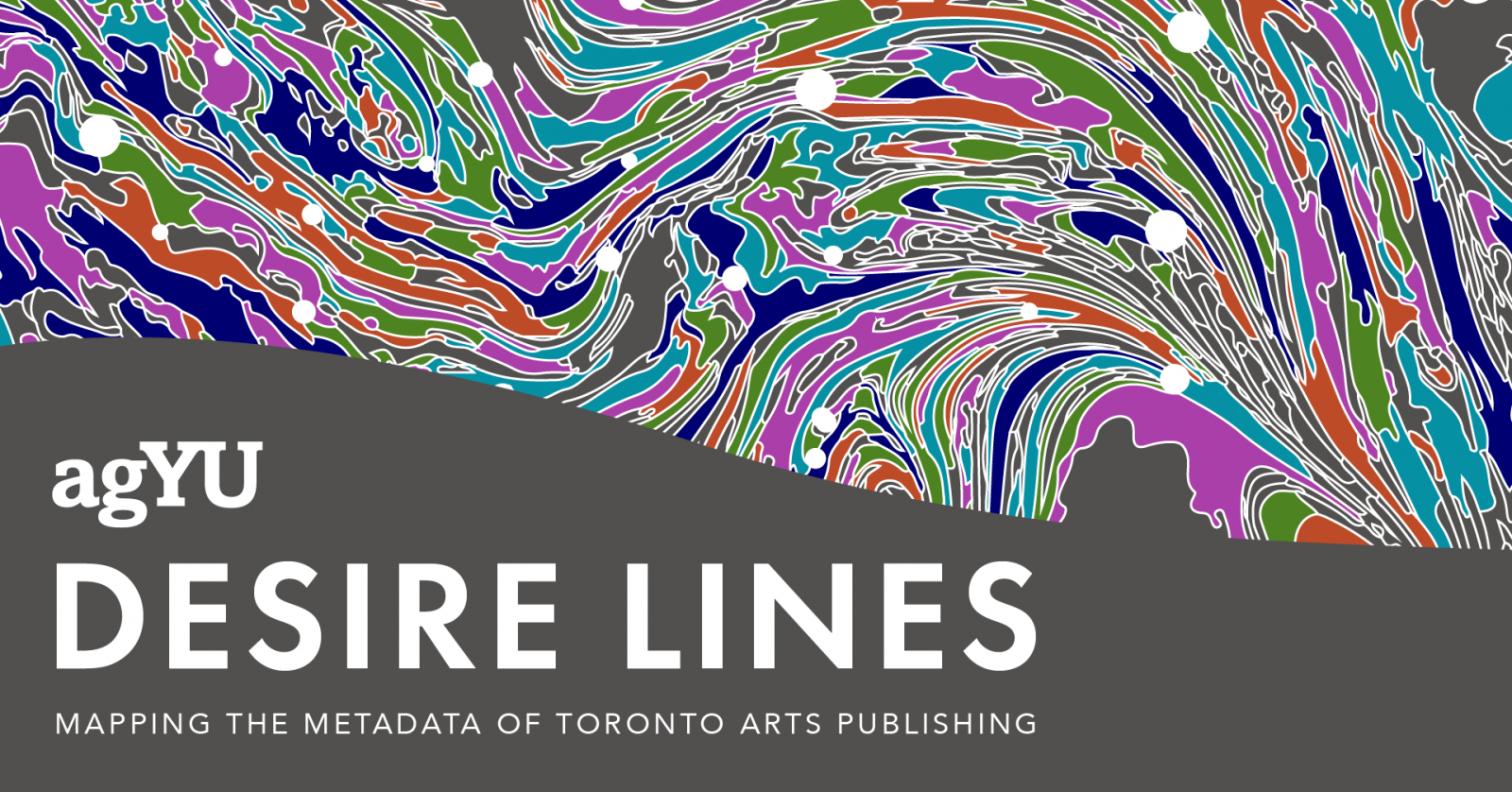Online
Fridays, February 26, March 26, April 30 + August 06, 2021 — 2PM to 3:30 PM
Artexte is proud to support the Art Gallery of York University in presenting the Desire Lines: Mapping the Metadata of Toronto Arts Publishing speaker series as a prequel to our future exhibition Lignes de désir // Desire Lines: Displaced Narrative of Place curated by Felicity Taylor. Mapping the Metadata of Toronto Arts Publishing is organized by Felicity Tayler (PhD, researcher, Interim Head and Research Support at the University of Ottawa Library – Arts and Special Collections), Michael Maranda (assistant curator at AGYU) and Faith Paré (poet and performer) whose participation was made possible by Spoken Web.
Artexte supports this series through research services and access to the physical and digital collection. Felicity Tayler’s investigation into the social, political and geographical spaces of Canadian magazine publishing in the 1970s and 1980s charts new territories of knowledge within and around Artexte’s holdings.
- February 26, 2021 : Riddim an’ Resistance
- March 26, 2021 : Setting a Tone
- April 30, 2021 : Access to Print
- August 06,2021 : Making a Network of Relations Visible
Organized and presented by the Art Gallery of York University:
“The Desire Lines series of talks explores the trajectory of arts magazine publishing in Toronto from the 1970s onward has always been a space criss-crossed by lines of desire. This speaker series takes an algorithmically produced network diagram of publishing metadata as a jumping-off point for story-telling around personal memories. Can the metadata describing the people and organizations producing magazine issues work as a narrative prompt to uncover hidden connections? What stories can we tell by reading the nodes (the dots representing either people or single magazine issues) as nouns, and edges (the links between these nodes; the desire lines proper) as verbs?
Taken together, recent Toronto conferences (This is Paradise at U of T Art Centre in 2015, State of Blackness at OCAD in 2014, and The Ecology of an Art Scene: Paris-Toronto Series at the Canadian Art Foundation in 2013) and exhibitions (Form Follows Fiction at U of T Art Museum, 2016, Tributes + Tributaries at the AGO in 2016, Is Toronto Burning? at the AGYU in 2014, and Migrating the Margins at the AGYU in 2017) revealed a common narrative of creative practice in Toronto: that the refusal of a singular avant-garde (or dominant tradition) takes place through the simultaneous presentation of multiple histories, each predicated upon a premise of concealment, absence, or lacunae. At the same time, these events framed recent Toronto history through trajectories of key charismatic figures understood as foundational to the scene, attractors that brought together resources necessary to establish collectives and issue publications.
The Desire Lines series of talks, however, is premised on the belief that what is important is not canonical figures, but the network produced through a cumulative collectivity. It is the physical traces of this network that allows us to see that the scene was (and continues to emerge as) a network, not individuals. For instance, through this alternate framing, we see that the intern working at several magazines simultaneously may be more consistently significant to the cohesiveness of the scene than the “significant” names we are accustomed to hearing and reading about.
Over the course of the sessions, the series will underline how the practice of publishing has always been a networked structure, a nexus of social relations and artist organizing that continues today. Through this reframing will come a speculative promise to build the tools to tell our histories in a way that counters personality-driven charismatic histories.
Instead of a narrative of the scene and the parties, we hope to trace material modes of production through an inscribing of physical objects into an ephemeral archive. Each panel will respond to a series of material objects (books, magazines, video) that will act as ciphers to prompt memory recall. A visualization enabled by the structured data describing the material production of Fireweed, Fuse and Border/Lines will also serve as projective space for building narratives of place. Questions that will be addressed include: Does an imaginary space of community arise when people publish alongside each other multiple times? Does this print culture space of the past resonate with present-day sensations of community in virtual spaces? Does this shared social imaginary have a relationship to a real geographic space? What does it mean to think about a narrative of a city, such as Toronto, when this narrative process is displaced into Zoom seminars? What mythologies or histories resonate beyond the local? Which do not and why might that be?”
– AGYU
Biographies:
Felicity Tayler is MILS, PhD is the Interim Head, Research Services (Arts and Special Collections) at the University of Ottawa. Her interests include art historical metadata modelling, data visualization, and the print culture of the artistic community. This series grows out of a Fellowship in the Department of History of Art at the University of Toronto. It is informed by her work as co-applicant on the SSHRC-funded SpokenWeb partnership, which foregrounds a coordinated and collaborative approach to literary historical study and digital development, with diverse collections of spoken recordings from across Canada and beyond. Tayler’s critical and scholarly writing has been published widely and related exhibitions have taken place at Artexte and the National Gallery of Canada Library and Archives, among other venues.
Faith Paré is a poet and performer of Afro-Guyanese and Québécois ancestries. Her writing has previously appeared in Arc Poetry Magazine, GUTS, and Shameless Magazine, and is forthcoming in Carnation. She is a proud alum of Our Bodies, Our Stories, a mentorship for emerging artists who are queer and trans BIPOC led by Kama La Mackerel, and was the recipient of the Quebec Writers’ Federation’s 2020 Mairuth Sarsfield Mentorship under the guidance of Dr. Gillian Sze. She is a co-founder of VOLTA Collective with Meredith Marty-Dugas and Paige Keleher, addressing anti-carceral action and transformative justice through creative intervention. Find her on Instagram: @paretriarchy





